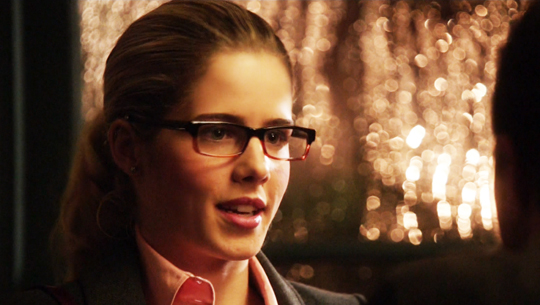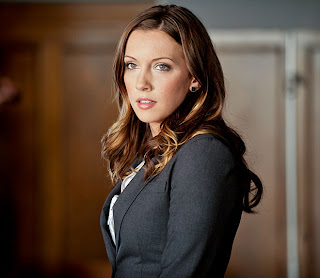A few months back I wrote my initial assessment of Arrow, The CW’s latest attempt to cash
in on their deals with Warner Brothers and DC Comics. I said it was pretty
good, but a little bland so far. I would like to revise that statement now.
Well, sort of.
It’s still pretty good, teetering on actually good, but it
has gotten past the blandness. Oliver Queen’s mission of bloody vengeance
against the people who “ruined” Starling City is compelling and pretty well
written. The snags he runs into along the way effectively raise the tension,
and the methods he uses are original enough to be engaging.
The one thing really killing the show for me are the
constant flashbacks to his time on the island. Not only are they largely
irrelevant to a story that unfolds in real time, they’re also lazy writing. And
the wig he wears is terrible.
But the real problem I have with the show is not so much in
the action or the storyline or even the occasionally ham-fisted acting from Mr.
Amell. My real issue with this show is that every single female character
(except one, and we’ll get to her later) is cripplingly emotional. And it’s
starting to get not just weird, but pretty offensive.
Let’s start with Oliver’s family. His mother and sister,
left behind when he and his father sailed off on their tragic yacht trip, have
been in mourning these past five years. His mother managed to move on
eventually (by marrying her dead husband’s best friend), but Thea seems to have
been mired in a constant state of misery and bad choices, turning to everything
from drugs to really obviously destructive relationships in a blatant cry for
help.
On their surface, I have no real problem with these
characters and their emotional problems. Moira, his mother, sank into a deep
depression upon getting the news of his and his father’s death, and from what
we can tell it was real and genuine. Of course, she also may have (SPOILERS)
ordered said death, or at least been complicit in it, but the grief she felt
was real.
So too, and arguably more so, is Thea’s sadness
understandable. She lost her father and her brother on the same day, as well as
being faced with her mother’s sink into near catatonia. It must have been
really hard for a twelve year old. I can get that she’s had trouble dealing.
What I don’t get is why every storyline involving these two
characters revolves wholly around how they are still emotionally damaged by
those events. I understand that scars linger, but I also understand that it’s
been five years, and presumably at this point they have something else to talk about. Anything. Seriously, I would sit
through a scene where Thea talks about her drug habits if she didn’t mention
how miserable without her brother she was fifteen times.
Blech.
You see, it’s not that I find their grief disingenuous, or
even narratively irrelevant. It’s that I resent the way that’s all they are.
Moira and Thea exist only to remind Oliver of the grief that he’s (indirectly)
caused. They are just vessels for a further understanding of the main male
hero, and have no other real purpose in the story. Which is dumb.
Along these lines, Helena, the awesomely wicked Huntress
from the comics, really only appears in the show to give voice to Oliver’s
growing alienation from the people around him. Her motivation, again, is pretty
understandable. She wants revenge on her mobster father for his brutal murder
of her fiancé. Helena hates her father and everything that he stands for, and
so goes to the ultimate extreme of trying to destroy his organization and kill
everything he loves before killing him.
Interesting character, right?
As she appears in the show, however, we only see Helena
through Oliver’s eyes. When he’s infatuated with her, we see her as a lost soul
looking for a path.
When he becomes alarmed at her rapacious appetite for
revenge, we see her as a cautionary tale. At no point do we get to see Helena
the way Helena sees herself. We only have Oliver’s word for it.
Some of that can be put off with the idea that in a show with
such a strong narrative arc and a clear lead character, everyone will be
defined by their relationship to said character. And that is true, up to a
point. The point where it becomes untrue, however, is where we become unable to
see any character outside of those definitions. Then it’s bad character
writing, and begins to work against eh show’s efforts to make us care about the
characters. We can only care to the extent that they are developed.
The female characters of Arrow
usually have reasons to be cripplingly emotional, but the show doesn’t give us
enough of their perspective for it to matter. Instead, what we see are women
wilting and whining, depressed and refusing to get out of bed, while our hero
straps on a quiver and goes out to fix the city. Clearly Oliver has more reason
to be emotionally distraught than all these women do, but we are shown that
since he does not choose to cry or break down, that these are not the “strong”
choices. Which is complete and utter crap.
Now, I did say there was one character on the show who
didn’t fit this, and that’s Laurel. While decidedly female, she’s the only
woman on the show who is not primarily ruled by her emotions. Even that tech
girl is! I would argue that this isn’t because Laurel is somehow better or more
meaningful than those other girls, though. I’m pretty sure that this is just
because they haven’t given her any characterization at all.
Think about it. What we know of Laurel on a personal level
could fit in a shoebox, and is, in fact, less than we know about Tech Girl. The
writers are presumably trying to show how “right” she is for Oliver by showing
her strength in the face of tragedy, but without any reaction at all, we don’t
have a reason to connect with her or like her. Say what you will about Thea’s
emotional problems, at least we always know where she’s coming from.
What it comes down to is this: Arrow is a fun, interesting show that is so obsessed with its white
male protagonist that all other characters and motivations are boiled down to
their interaction with and reaction to his existence. Until the show can let
its characters stand on their own, it’s never going to gel.
 |
| I love you Tech Girl. |





Good review abut the female characters in this show.
ReplyDeleteThe actress for laurel is bad though, she just falls flat in her expressions making it more difficult to connect with the character.
Yay love felicity, so cute but she needs to be less defined by the "white protaganist" too.
*white male protaganist*
ReplyDeleteإعطاء فكرة واضحة عن الأثاث والأشياء التي يمكن حفظها واستخدامها في المنزل الجديد ، ولا بأس لرسم غرفة المعيشة على سبيل المثال ووضع جميع الأثاث ، وهذا يساعد في ترتيب الغرفة بصريا.شركة نقل عفش
ReplyDelete